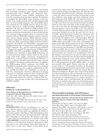 143 citations,
October 1996 in “Dermatologic Clinics”
143 citations,
October 1996 in “Dermatologic Clinics” Too much androgen can cause hair loss; finasteride may help.
 July 2023 in “International journal of life science and pharma research”
July 2023 in “International journal of life science and pharma research” The herbal hair cream could help treat male pattern baldness by blocking a baldness-related enzyme and might be worth further investigation.
12 citations,
June 2007 in “Journal of steroid biochemistry and molecular biology/The Journal of steroid biochemistry and molecular biology” A reliable model for screening type II 5α-reductase inhibitors was created and validated.
1 citations,
January 2014 Biochanin A promotes hair growth in mice with testosterone-induced hair loss.
AGA is caused by genetics and androgens, treatable with finasteride and minoxidil.
41 citations,
April 1997 in “Fertility and sterility” Clomiphene citrate can reverse low hormone levels and symptoms in male runners with hypogonadotropic hypogonadism.
April 2019 in “Journal of the Endocrine Society” Care for gender-dysphoric Veterans can be improved with a consistent, team-based approach.
 1 citations,
January 2017 in “Tohoku journal of experimental medicine”
1 citations,
January 2017 in “Tohoku journal of experimental medicine” A woman's mature cystic teratoma caused her virilization by producing testosterone.
 September 2023 in “IP Journal of Nutrition, Metabolism and Health Science/IP Journal of Nutrition Metabolism and Health Science”
September 2023 in “IP Journal of Nutrition, Metabolism and Health Science/IP Journal of Nutrition Metabolism and Health Science” Recognizing and managing hirsutism, alopecia, and acne is crucial for improving wellbeing in women with PCOS.
77 citations,
October 1986 in “The Journal of clinical endocrinology and metabolism/Journal of clinical endocrinology & metabolism” Nafarelin may effectively treat excessive hair growth in women by reducing certain hormone levels.
 January 1998 in “NEJM Journal Watch”
January 1998 in “NEJM Journal Watch” Finasteride increases hair count in men with hair loss, but the effect isn't permanent and hair loss returns if treatment stops.

Dihydrotestosterone (DHT) and its active metabolites play a key role in various diseases, and the development of 5α-reductase inhibitors can help treat these conditions.
76 citations,
November 1997 in “The American journal of psychiatry” Some autistic children may have higher levels of male hormones, which could be linked to aggression.
 23 citations,
January 1998 in “Urological research”
23 citations,
January 1998 in “Urological research” Castration and finasteride lower urinary oxalate in male rats, potentially treating urolithiasis.
 35 citations,
January 2012 in “The Journal of Sexual Medicine”
35 citations,
January 2012 in “The Journal of Sexual Medicine” Androgen Deprivation Therapy for prostate cancer often reduces sexual function but intermittent therapy may be more tolerable.
 February 2012 in “Community oncology”
February 2012 in “Community oncology” The document concludes that accurately identifying leukemia types is crucial, and the risks of cancer from finasteride need careful evaluation against its benefits.
67 citations,
April 1988 in “The Journal of Clinical Endocrinology & Metabolism” A subtle androgen receptor abnormality can allow normal male development and sometimes fertility despite partial androgen resistance.
 8 citations,
January 1991 in “European Urology”
8 citations,
January 1991 in “European Urology” Finasteride lowers DHT levels and raises testosterone in a dose-dependent way.
 April 2020 in “Journal of the Endocrine Society”
April 2020 in “Journal of the Endocrine Society” A patient with untreated congenital adrenal hyperplasia had large benign tumors in her adrenal glands removed, improving her symptoms.
February 2014 in “아시안뷰티화장품학술지” Natural extracts like peppermint and rosemary oils are effective for hair growth and scalp health.
 51 citations,
October 2002 in “British Journal of Dermatology”
51 citations,
October 2002 in “British Journal of Dermatology” Finasteride increases hair density in female androgenetic alopecia, but individual results may vary.
 12 citations,
January 1991 in “Archives of dermatological research”
12 citations,
January 1991 in “Archives of dermatological research” Male hormones control a specific gene in hamster skin, with different hormones having varying effects.
9 citations,
September 2002 in “The Journal of clinical investigation/The journal of clinical investigation” Blocking testosterone speeds up wound healing in males.
 55 citations,
March 1990 in “The Journal of Clinical Endocrinology and Metabolism”
55 citations,
March 1990 in “The Journal of Clinical Endocrinology and Metabolism” Finasteride may treat baldness but less effective for those with 5α-reductase deficiency.
 147 citations,
April 1990 in “The Journal of Clinical Endocrinology and Metabolism”
147 citations,
April 1990 in “The Journal of Clinical Endocrinology and Metabolism” Finasteride safely lowers DHT levels without affecting testosterone.
 1 citations,
May 2011 in “Journal of Human Reproductive Sciences”
1 citations,
May 2011 in “Journal of Human Reproductive Sciences” Finasteride may decrease semen quality but not harm sperm production, and stopping the drug can improve semen quality; hyperprolactinemia can cause infertility but is treatable with medication.
 46 citations,
August 1990 in “The Journal of clinical endocrinology and metabolism/Journal of clinical endocrinology & metabolism”
46 citations,
August 1990 in “The Journal of clinical endocrinology and metabolism/Journal of clinical endocrinology & metabolism” Ketoconazole reduced hair growth and improved acne in women, but caused side effects needing careful monitoring.
207 citations,
September 2002 in “The Journal of clinical investigation/The journal of clinical investigation” Blocking testosterone speeds up wound healing in males.
 1 citations,
August 2002 in “Zeitschrift für Hautkrankheiten”
1 citations,
August 2002 in “Zeitschrift für Hautkrankheiten” Male androgenetic alopecia involves hair follicle miniaturization due to DHT, with potential treatments using inhibitors and blockers.
 198 citations,
July 2011 in “Cochrane library”
198 citations,
July 2011 in “Cochrane library” Lifestyle changes can improve body composition, excess male hormone levels, and insulin resistance in women with PCOS.



















